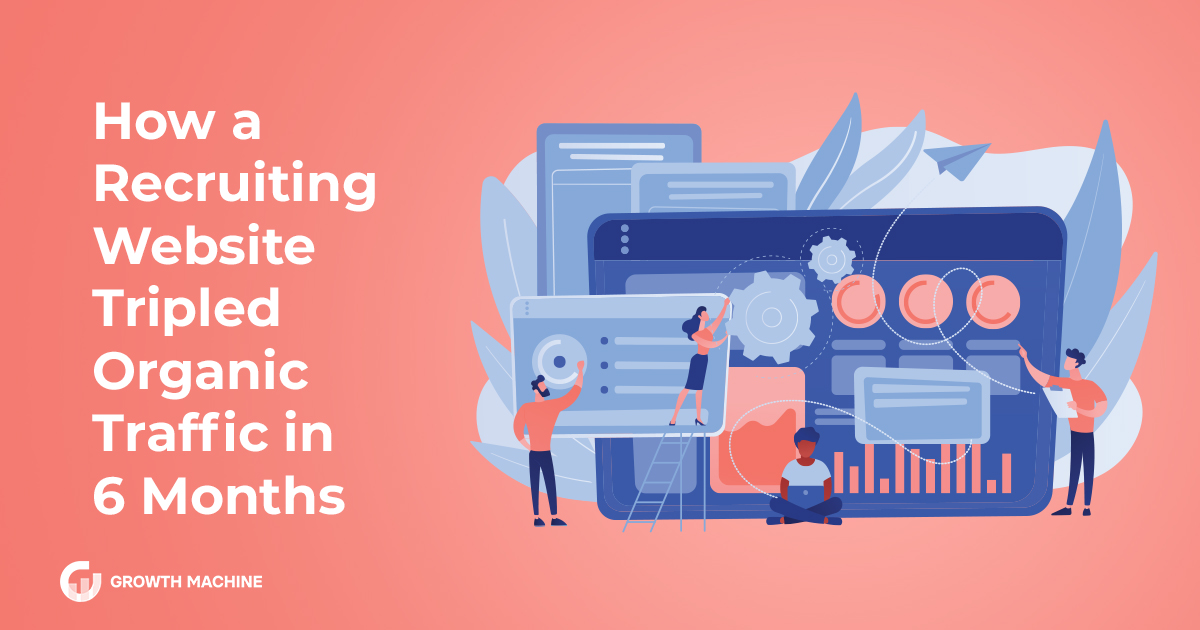How a Recruiting Website Tripled Organic Traffic in 6 Months
When Scholars, the employer branding and university recruiter resource, launched almost two years ago, their content was focused on articles to help HR managers and recruiters improve their internship hiring process. The objective was to build trust with a corporate audience.
But as their business continued to evolve, we realized that type of content wasn’t moving the needle fast enough. So we pivoted.
Rather than appealing to their B2B readers, we began testing content to cater to their customers’ audience: people entering the job market.
This bottom-up approach got results fast.
After about six weeks of publishing content about internships and entry-level jobs, their organic traffic doubled.
They started out with 300 monthly sessions at launch, and eight months later got to 8,000 monthly sessions, or 2,567% growth.
Traffic and keyword rank have continued to grow ever since. Here’s the story of Scholars.
The Original Keyword and Content Strategy
Scholars plays in the B2B space. They sell to talent and recruitment management, and often to HR. When we first began working with Scholars, we identified a niche opportunity for recruiters, so we began writing content for that audience. The original keyword and content plan included topics like:
- How to hire an intern
- Internship offer letter
- Conducting intern evaluations
The blog articles were well-written and optimized, and though Scholars eventually began to rank in top 10 or top 15 spots for those keywords, the uptick in organic traffic was marginal, indicating relatively low demand for this information.
Since we stayed in close connection with the Scholars team and had a steady pulse on website analytics, we could tell we’d need to adjust our strategy soon.
How We Knew It Was Time to Pivot
After about four months of publishing, we revisited our content strategy to evaluate progress. This is partly why we advise our clients to wait at least six months for measurable SEO success — doing so bakes in the time it takes to take a step back and reassess the content plan, and test other types of content, if necessary.
In conversation with the Scholars team, we proposed a new content niche for them: their end user. As in, writing more content for the people who are the target audience for Scholars’s customers.
CEO Ben Siegel says, “This bottom-up marketing approach allowed us to establish credibility with the end users — college students and new graduates. This in turn gave our prospective customers even more reason to trust in us.”
Some examples of this content?
- How to cold email for an internship
- How long are internships
- Internship at <insert company name>
We created detailed blog articles about internships in general and internships at various top tech companies, including how to apply, what to expect, and more.
Love to See It: Major Markers of Success
Just six weeks after launching our revised content strategy, we saw a marked uptick in traffic. After three months of publishing with end user-focused content, Scholars’s organic traffic went from ~200 sessions per week to ~800 sessions per week. Today, they have around 5,000 sessions per month.
And it wasn’t just traffic that indicated that both Google and searchers liked what they saw. Since Scholars was a brand new website, they initially had single-digit domain authority. Today their domain authority is 34.
They started without any keywords on the first page of Google search results. Today, they have 24 keywords ranking on page one, including seven keywords for which they rank #1.
And according to Ahrefs data, they rank for ~6,700 keywords — these keywords rank in the top 100 organic search results across all countries in Ahrefs’s database.
With these remarkable content marketing success metrics, the Scholars team quickly began using this content to power the rest of their marketing efforts.

Email Marketing
By creating a definitive resource for college students and recent grads, Scholars established trust with their would-be clients’ target audience. The valuable top-of-funnel content we created gave readers a reason to stay on their blog. So much so, their simple email popup has yielded thousands of subscribers. In just 15 months, they’ve grown their email list from zero to over 20,000 people.

This list yields benefits for both Scholars and their subscribers. Scholars has a captive audience of college students and new graduates that are now armed with information that’s helpful for talent managers and recruiters. And subscribers are first to know about Scholars’s helpful blog posts and podcast episodes.
All this meant that when Scholars started new marketing initiatives, they had a subscriber list to promote them to. So when they launched their podcast, “The Internship Show,” they weren’t exactly starting a listenership from scratch.
The Internship Show
That’s right, there’s even a podcast — one that was born out of this revamped content strategy geared towards end users.
In “The Internship Show,” co-founder and chief operating officer Parker Pell interviews university relations staff and campus recruiters at Fortune 500 companies. Guests tell their story, share what it’s like to work at their company, and give job hunting advice to prospective interns.
After more than a year of publishing episodes, they’re now seeing 20,000 episode downloads per month.
Since we believe in repurposing all of your content, the Growth Machine editorial team turns various podcast episodes into blog posts, further feeding their content production cycle.
What started as a lead generation program has turned into full-fledged media operation within the Scholars ecosystem.
What’s Next
Today, Scholars has a content flywheel that’s giving way to new formats. As an offshoot of “The Internship Show,” they’ve begun doing “office hours,” or dedicated podcast episodes where CEO Ben Siegel and COO Parker Pell answer questions from new grads.
Now that Scholars has a robust library of 80+ articles, we’ve refocused our efforts on link building.
Content marketing has proven so effective for them that they hired an in-house content manager, and we continue to work with them in directing their overall keyword and content strategy.
If you like what you’ve read in this case study but aren’t quite convinced, check out our previous case studies with a direct-to-consumer beverage company, and with an informational website.
But you want to talk about how we can grow your website, give us a shout. We’d love to discuss the opportunity.
And if you want to learn more about Scholars’s SEO success, check out our recent podcast episode below.







